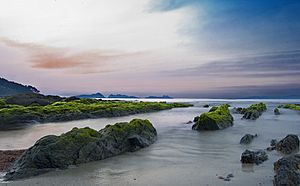Battle of Bayona Islands (1590) facts for kids
Quick facts for kids Battle of Bayona Islands (1590) |
|||||||
|---|---|---|---|---|---|---|---|
| Part of the Eighty Years' War and the Anglo-Spanish War (1585–1604) | |||||||
 Photography of the Cies Islands by Alberto Pérez]. |
|||||||
|
|||||||
| Belligerents | |||||||
| Commanders and leaders | |||||||
| Unknown | Pedro de Zubiaur | ||||||
| Strength | |||||||
| 14 ships | 3 flyboats | ||||||
| Casualties and losses | |||||||
| 14 ships captured (7 ships boarded) (Flagship boarded and captured) |
Unknown | ||||||
The Battle of Bayona Islands was an important sea battle. It happened in early 1590. The fight took place near the Cíes Islands in Spain. These islands were then known as the Bayona Islands.
This battle was part of bigger conflicts. These included the Eighty Years' War and the Anglo-Spanish War (1585–1604). It also happened during the French Wars of Religion.
A Small Spanish Fleet Wins Big
In this battle, a small Spanish naval force fought against a larger Anglo-Dutch fleet. The Spanish force was led by Captain Don Pedro de Zubiaur. He had only three fast ships called flyboats. The Anglo-Dutch fleet had 14 ships.
The battle lasted for several hours. Even though the Spanish had fewer ships, they fought very well. They achieved a great victory.
The Outcome of the Battle
The Anglo-Dutch fleet was completely defeated. The main ship of the Dutch fleet was captured. Six other ships were also taken by the Spanish.
In the end, the remaining Anglo-Dutch ships had to give up. Captain Pedro de Zubiaur then sailed to Ferrol. He brought all the captured ships with him. This was a big surprise for the Spanish officials there.
See also
 In Spanish: Batalla de las Islas Cíes (1590) para niños
In Spanish: Batalla de las Islas Cíes (1590) para niños

